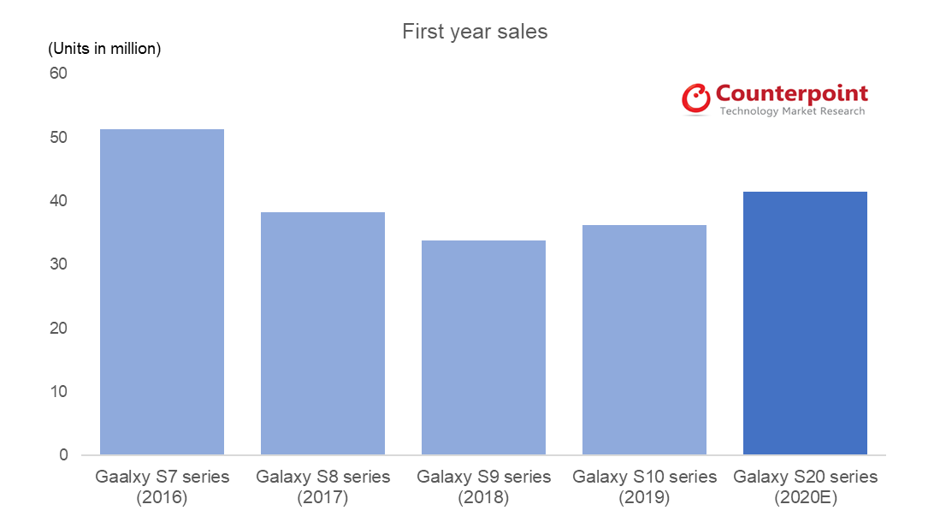The next-generation Samsung Galaxy S20 series smartphone will be unveiled at the company’s Unpacked event which takes place on February 11. We expect 2020 shipments to exceed 40m units, driven by the rumored camera and hardware spec improvements, default 5G, and competitive retail pricing. Shipment numbers will also reflect an expected 2020 smartphone market recovery, resulting in another year of growth for a Samsung flagship release.
 Much of the Galaxy S20 focus has been on the cameras, with the base model rumored to have 12MP main, 10MP front-facing, 64MP telephoto with 3x optical zoom, and 12MP ultrawide angle camera; with the S20 Plus having an additional ToF camera. The top-end Galaxy S20 Ultra is likely to come with a 108MP main, 40MP front-facing, 48MP telephoto with 10x optical zoom paired with a possible 100x digital zoom, providing for powerful hybrid functionality.
Much of the Galaxy S20 focus has been on the cameras, with the base model rumored to have 12MP main, 10MP front-facing, 64MP telephoto with 3x optical zoom, and 12MP ultrawide angle camera; with the S20 Plus having an additional ToF camera. The top-end Galaxy S20 Ultra is likely to come with a 108MP main, 40MP front-facing, 48MP telephoto with 10x optical zoom paired with a possible 100x digital zoom, providing for powerful hybrid functionality.
The Ultra model is also expected to come with a market-leading 16GB of RAM, positioning it as the industry standard for 5G. Sujeong Lim, research analyst at Counterpoint Research, states: “High-definition live video, high-end cloud gaming, and XR are important use cases in the early 5G era, and Samsung’s 16GB of high RAM capacity is considered as a preparation to provide a good user experience for these 5G applications.”
The S20 base model’s expected price tag of US$850 comes in at US$50 less than the S10 equivalent at launch, and should ease some resistance potential buyers will feel from premium prices. This, coupled with more 5G network rollouts “will have a positive effect on pulling up sales volume as 5G commercialization expands in the US, Europe, and other regions”, according Sujeong Lim. The S20 line could also come with LTE variants, allowing even lower pricing in regions where 5G has yet to make significant commercial inroads.
One risk to Counterpoint Research’s forecasts comes from the coronavirus situation. Although Samsung closed its Huizhou handset production line in 2H19, mitigating some of its production risk, retail sales could be hit as public events and marketing activities are scaled down due to virus fears. This is especially true in China where, so far, many cities have effectively shut down in efforts to contain the virus.

























